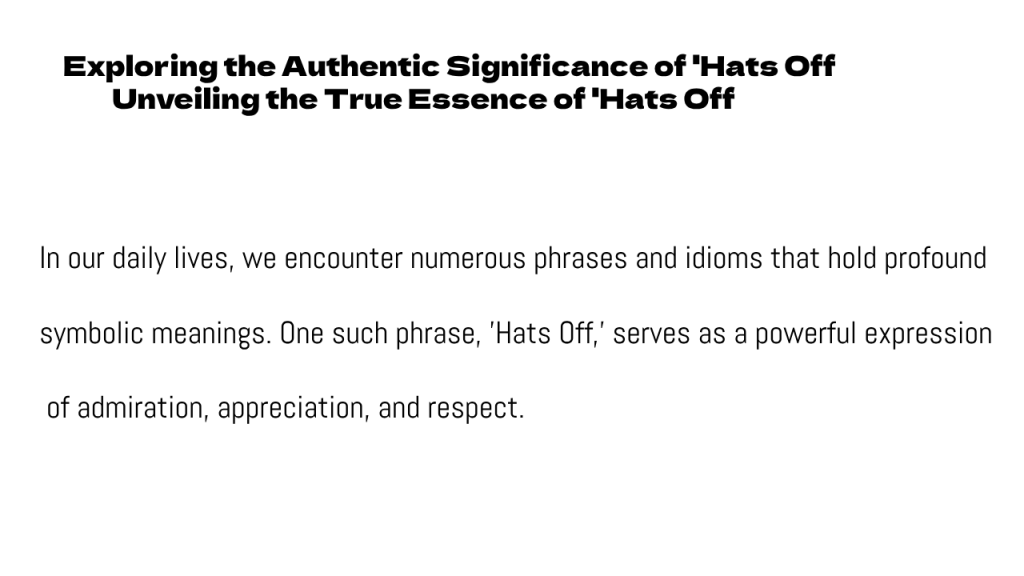Exploring the Authentic Significance of ‘Hats Off
Unveiling the True Essence of ‘Hats Off
In our daily lives, we encounter numerous phrases and idioms that hold profound symbolic meanings. One such phrase, ‘Hats Off,’ serves as a powerful expression of admiration, appreciation, and respect.
Origin and Historical Background of the Expression
Tracing the Roots of ‘Hats Off’
The phrase ‘Hats Off’ finds its origins in the 18th century, a time when men commonly wore hats as an integral part of their attire. Removing one’s hat was considered a gesture of respect and humility, symbolizing deference to those of higher social standing or displaying reverence in specific situations.
Symbolic Implications of ‘Hats Off’
Unveiling Vulnerability and Openness
‘Hats Off’ carries profound symbolic meaning, representing the act of unveiling one’s head. This gesture symbolizes vulnerability and openness, as individuals bare their authentic selves and let down their guard. Baring the head signifies paying homage and acknowledging remarkable accomplishments.
Cultural Significance and Influence
Embracing Diverse Cultural Traditions
‘Hats Off’ holds great cultural significance in various parts of the world, each with its own unique customs and gestures to convey respect and admiration. While Western societies widely adopted the removal of hats as a sign of respect, cultural norms may differ across regions. Understanding local customs is crucial to avoid misunderstandings.
Everyday Language Usage
Extolling Excellence and Achievement
Beyond its literal meaning, ‘Hats Off’ has seamlessly integrated into everyday language. Metaphorically, it is employed to praise individuals for their achievements, talent, or positive actions. The phrase has become popular as a means to acknowledge excellence and show genuine appreciation for endeavors.
‘Hats Off’ within the Fashion Industry
Celebrating Style and Individuality
In the realm of fashion, ‘Hats Off’ carries both a literal and figurative connotation. Hats have long served as iconic accessories, symbolizing style, elegance, and individuality. The phrase ‘Hats Off’ is often used to acknowledge fashion designers, milliners, and creators of extraordinary headwear, celebrating their craftsmanship and unique contributions.
‘Hats Off’ in the World of Entertainment
Applauding Talent and Dedication
Professionals in the entertainment industry frequently receive accolades for their exceptional performances or contributions to the arts. ‘Hats Off’ is a common expression used to applaud actors, musicians, directors, and other creatives who captivate audiences with their talent and unwavering dedication.
‘Hats Off’ as an Emblem of Respect
Honoring Solemn Occasions
The act of removing one’s hat, accompanied by the phrase ‘Hats Off,’ remains a potent symbol of respect. It is commonly observed during solemn occasions such as funerals, memorial services, or while the national anthem is played, allowing individuals to pay tribute and honor the solemnity of the moment.
Alternative Manifestations of Reverence
Diverse Expressions of Respect
While ‘Hats Off’ is a widely recognized expression of respect, various alternative phrases and gestures are employed worldwide. In certain cultures, bowing or folding hands together in prayer is a customary way to exhibit reverence. These expressions may vary based on traditions, customs, and social norms.
The Evolutionary Journey of ‘Hats Off’
Adapting to Changing Times
As time progresses, cultural practices and expressions naturally evolve. Although physically removing one’s hat may be less prevalent in everyday life, the symbolic significance of ‘Hats Off’ remains. It has transcended its literal origins and transformed into a metaphorical expression of appreciation and admiration.
‘Hats Off’: A Manifestation of Appreciation
Recognizing Acts of Kindness and Excellence
‘Hats Off’ extends beyond formal occasions or professional achievements; it is also used in casual settings to acknowledge acts of kindness, selflessness, or exceptional performance. Whether it’s a friend extending a helping hand or a colleague going above and beyond, ‘Hats Off’ serves as a way to recognize and celebrate these actions.
The Impact of ‘Hats Off’ in Social Media
Amplifying Recognition and Appreciation
In the digital age, expressions like ‘Hats Off’ have made their way into social media platforms. Hashtags such as #HatsOff or #Respect are used to highlight noteworthy achievements, community contributions, or extraordinary events. Social media provides a platform to amplify recognition and appreciation for individuals and causes.
Common Misinterpretations of ‘Hats Off’
Ensuring Clarity in Expression
Despite its widespread usage, ‘Hats Off’ can occasionally be misinterpreted or misunderstood. Some individuals may perceive it as sarcasm or insincerity, leading to potential offense. It is crucial to consider the context and the relationship with the person being acknowledged to ensure clear communication of intent.
‘Hats Off’ in Literature and Popular Culture
Adding Depth to Narratives
‘Hats Off’ has permeated literature, films, and various forms of popular culture. It is often used to evoke admiration or pay homage to fictional characters, historical figures, or real-life heroes. This phrase adds depth and emotional resonance to storytelling, highlighting moments of triumph, bravery, or exceptional qualities.
FAQs
Q: Is ‘Hats Off’ still commonly used today? A: Yes, ‘Hats Off’ remains a prevalent expression used to demonstrate respect and admiration.
Q: Are there any cultural variations of ‘Hats Off’? A: Indeed, different cultures exhibit their own distinctive ways of expressing respect and admiration.
Q: Can ‘Hats Off’ be used sarcastically? A: While it is conceivable, it is crucial to consider the context and the relationship with the individual being acknowledged.
Q: How can ‘Hats Off’ be used in social media? A: Individuals frequently employ hashtags like #HatsOff or #Respect to acknowledge notable achievements or community contributions.
Q: What are some alternative expressions of respect? A: Alternative expressions of respect include bowing, folding hands together in prayer, or utilizing other culturally specific gestures.
